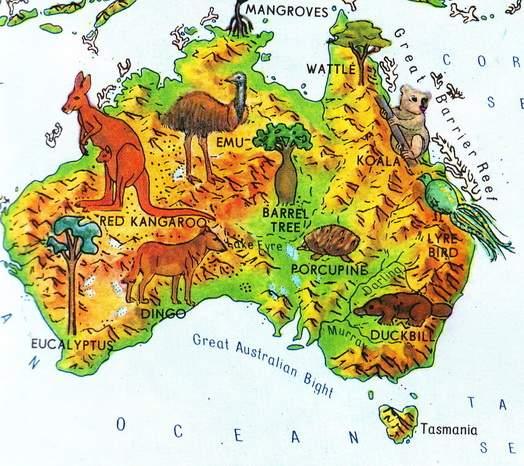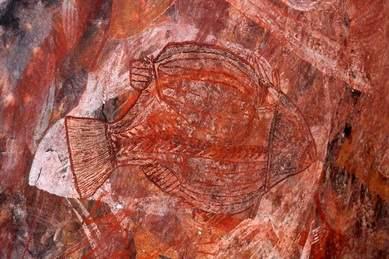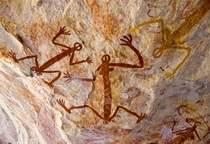Procedure
1. Introduction. Brainstorming.
T: Dear pupils, I'm glad to see you again. I’m sure you expect me to tell something extraordinary or special. You’re right. We are going to speak about the most mysterious country of the world. I suppose while listening to the Anthem of the country you’ll guess what country we’ll visit. Please stand up and listen to one part of the Anthem.
The National Anthem
Advance Australia Fair
Australians all let us rejoice,
For we are young and free;
We’ve golden soil and wealth for toil,
Our home is girt by sea;
Our land abounds in Nature's gifts
Of beauty rich and rare;
In history's page, let every stage
Advance Australia fair!
T: Pupils, have you guessed what country it is. Certainly you're right, it’s Australia.
2. Warming up. Microphone.
T: So pupils it's quite clear that the theme of our lesson is Australia. Please, imagine that this is a microphone and try to give answers to my questions. You can answer if you have a microphone, you can’t anwer without it.
What interesting facts do you know about Australia?
Why do people call it terra - incognita? (Legends of Terra Australis Incognita—an "unknown land of the South"—date back to Roman times and before)
Do you know any exotic animals in Australia?
Have you ever been to Australia?
3. Main Part
a) Phonetic drill. T: Pupils, look at the blackboard and repeat the following words after me:
Australia
marsupial
Tasmania
convicts
Melbourne
eucalyptus
Aborigines
Mount Kosciusko, Southern Hemisphere
c) Listening Comprehension. Watching the Video “Australia-Location, Boundaries and Physical Divisions”
b) After listening. Critical thinking training
T: Say if these statements are True or False with the help of the words:
- I strongly disagree, because…
- I strongly agree…
- You're absolutely right.
- I totally disagree, because…
Australia is the largest continent of the world;(I strongly disagree, because it’s the smallest continent)
It’s official name is Commonwelth of Australia ; (I strongly agree)
Australia’s name is derived from the Latin word “Australis” meaning ‘northern’; (I strongly disagree, because it means ‘southern’)
Australia is the largest continent in the world; I strongly disagree, because Australia is the sixth largest country in the world)
In 1603 the Dutch ship sailed along the coast on Northern Australia with a great interest ; (I strongly disagree, because the Dutch ship sailed along the coast on Northern Australia with a little interest)
In 1642 another Dutch ship captained by James Cook sailed South Australia and discovered the island, now known as Tasmania. ; (I strongly disagree, because the Dutch ship was captained by Abel Tasman)
The British Government sent a ship led by James Cook to know more about Australia; ;( I strongly agree that the British Government sent a ship led by James Cook to know more about Australia ;)
Captain Cook reached the coast of Australia in 1776; (I strongly disagree, because Captain Cook reached the coast of Australia in 1770)
Australia celebrates its National Day on July 26th; (I strongly disagree, because Australia celebrates its National Day on January 26th.
Australia lies in the Southern Hemisphere and in the Eastern Hemishhere. ( I strongly agree that Australia lies in the Southern Hemisphere and in the Eastern Hemisphere )
Australia is bordered by the Indian Ocean in the west and the Pacific Ocean in the East. (I strongly agree that Australia is bordered by the Indian Ocean in the west and the Pacific Ocean in the East)
c) Team work. T: Pupils, please come here. In the box there are different colours, choose one and you will know what team to join. One team "Red" using the factfile will speak about the geographical position of the country near the map, the other team "Blue" will ask them questions for additional information.
Take cards with your tasks:
Location: the Southern Hemisphere
Situation: the biggest island or the smallest continent
Washed: the Indian Ocean, the Pacific Ocean;
Territory: more than 7ml. sq. kilometers;
Population: 17 ml. inhabitants;
Native people: Aborigines;
Surface: low, flat desert;
Highest point: Mount Kosciusko
T: Speaking about Australia you can come across new words. In your handouts match words with their definitions:
Key: 1) e; 2) i; 3) g; 4) h; 5 f; 6) j; 7) a; 8) b; 9) c; 10) d.
e) Reading Comprehension. T: There is no country without past so I advise you to read the text about Australia's past to understand present.
Aboriginal rock paintings
“Australia’s Past”
The first people, who came to Australia more than 40 thousand years ago, were the Aborigines.
Chinese sailors visited this continent 2,500 years ago, and Dutch sailors - William Jansz in 1606 and Abel Tasman in 1642 came much later. In 1770 the British sailor Captain James Cook landed on the east coast, and raised Union Jack to claim it for Britain. It was the beginning of a terrible time for the Aborigines.
Britain soon started to send convicts to the new country. In the spring of 1787, eleven ships with 772 convicts left England for Australia. They reached Port Jackson - now Sydney in January 1788.
Life was very difficult for the convicts, and they had to work very hard, making roads, buildings and farms and simply to survive.
In 1851 gold was found in New South Wales and Victoria. Thousands of Australians then people from North America, Britain, New Zealand, China went looking for gold. The population grew very quickly, and in 10 years it grew from 400,000 to 1,200,000 inhabitants. With the gold came new roads, railways and new cities.
On 1 January 1901 the six states united in one country. After 1945 people from other European countries, like Italy, Germany, Greece and Holland started coming to Australia. Since 1945 more than 3 million people have moved there, and recently people from Vietnam and Kampuchea have also moved there.
f) After reading.
T: Choose the right item to complete the following sentences:
1) The first people in Australia were -------
2) The smallest continent was visited by------
3) James Cook said that Australia --------
4) The first white settlers from Britain were -------
5) The previous name of Sydney was --------
6) Thousands of people went to Australia looking for -------
7) On 1 January 1901 the six Australian states became ------
8) With the discovery of gold came -------
9) A lot of immigrants began coming to Australia from ------
Key: 1) Aborigines; 2) Chinese, Dutch and British sailors; 3) belonged to Britain; 4) convicts; 5) Port Jackson; 6) gold; 7) one country; 8) came new roads, railways and growing cities; 9) Italy, Germany, Greece and Holland.
4. Feedback. Dear pupils, our lesson is coming to its end. We’ve worked very hard. We’ve learnt a lot of useful information about Australia. Probably you'll use it at your geography and history lessons. I'll be glad if you are a success. To summarise what we've learnt I've prepared some exercise for you. So, we are going to revise everything that you know about Australia. These cards can help you.
T: Pupils, your home assignment is to speak about Australia's past, and try to find material about Australia's wild life.
Dear pupils, thank you for being so hard-working, persistent and keen. Our lesson is over.

 Получите свидетельство
Получите свидетельство Вход
Вход














 Australia. "Terra Incognita" (0.14 MB)
Australia. "Terra Incognita" (0.14 MB)
 0
0 1120
1120 99
99 Нравится
0
Нравится
0


